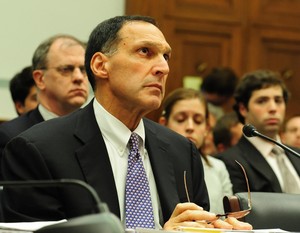Fuld Hits Fed And Fed Hits Back
Former Lehman Brothers Chief Executive Richard Fuld has consistently blamed shadowy market forces and the government’s unwillingness to help his company for the failure of the firm in September 2008, and his testimony to the Financial Crisis Inquiry Commission on Wednesday doesn’t waver from that stance. But Scott Alvarez, the general counsel for the Federal Reserve Board, has a different view.
Alvarez, speaking at a morning panel of the commission, disputes some of Fuld’s assertions. Lehman didn’t fail because the government didn’t help it, Alvarez told the panel led by Phil Angelides, it failed because it was a “victim of circumstance” and “bad decisions.”
Don’t tell that to Dick Fuld, though. In his written remarks, released before his scheduled afternoon appearance, Fuld contends Lehman’s demise was caused by “uncontrollable market forces” and the “incorrect” public perception that it didn’t have enough capital. He says he proposed several steps the government could have taken to save Lehman from bankruptcy, including being allowed to convert to a bank holding company, granting it an exemption so its Utah bank subsidiary could raise deposits, and imposing a ban on naked short selling. “Each of those requests was denied,” Fuld said.
It is true the government didn’t take those steps…..at least not until days after Lehman’s bankruptcy filing. Goldman Sachs and Morgan Stanley were allowed to convert to bank holding companies, putting them under the auspices of the Fed, in late September, an SEC ban on short sales in hundreds of financial shares also came in late September, and well, the Utah bank idea went nowhere. Fuld’s testimony suggests people were out to get Lehman.
“Lehman was forced into bankruptcy not because it neglected to act responsibly or seek solutions to the crisis, but because of a decision, based on flawed information, not to provide Lehman with the support given to each of its competitors and other non-financial firms in the ensuing days,” Fuld says in his statement.
But the government’s deliberateness in letting Lehman fail isn’t quite the story, Alvarez said in response to questioning from the panel. Lehman faced a serious run on its liquidity in those final days. It talked to the Fed about converting to a bank holding company, but it never actually applied for one, he said. (Maybe Lehman figured out it wouldn’t work: Alvarez told the panel the Fed didn’t think it would pass muster. But, he says, they never told that to Lehman). And Lehman’s plans for its bank subsidiary were not grand enough to lift it out of its liquidity problems. As for the “flawed information,” Alvarez said all the information the Fed had came from Lehman itself. He didn’t address the naked short selling issue.
Fuld’s written statement doesn’t address accounting issues raised in the months before Lehman’s collapse. By late spring, prominent hedge fund manager David Einhorn was publicly denouncing Lehman’s accounting tactics, and Lehman was fighting back. But a report by the bankruptcy examiner revealed Lehman’s use of undisclosed repurchase agreements to move assets off its balance sheet at quarter end and make it look like it had lower leverage.
The panel will undoubtedly question him about it this afternoon.








